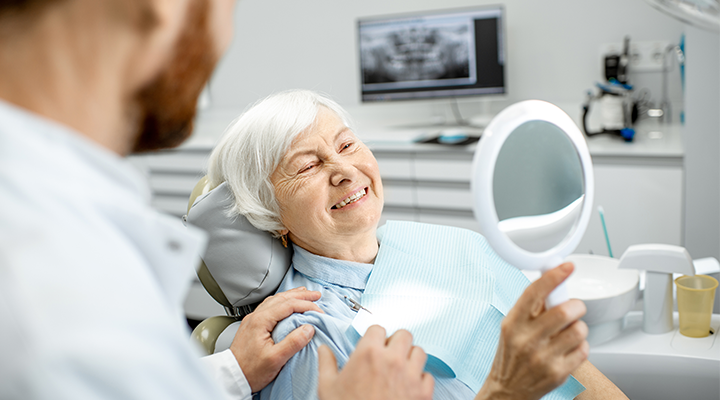Older adults can expect to experience a few age-related changes in their lifetime including problems with the teeth and gums. They may not be as concerned about the color of their braces or how much money the tooth fairy gives out anymore, but avoiding poor dental health in older adulthood requires consistent smile care.
Use our tips to avoid these three common dental health challenges that older adults encounter:
Tooth Decay
Many people associate cavities with children chomping on candy. But tooth decay is actually a common chronic problem for people 65 and older. According to the Center for Disease Control, 20% of adults aged 65 and older currently have untreated tooth decay.
Today, people are capable of keeping the majority of their teeth for their entire life. Tooth loss isn’t connected to aging, but to poor oral hygiene and contributing medical conditions. Oral health concerns like tooth decay increase as gums recede away from teeth and root surfaces become exposed.
Mitigating this requires frequent attention both at home and from the dentist. The trouble is that many older adults don’t go to the dentist as often as they used to. 30% of older adults have problems with reliable transportation. Whether it’s due to mobility and independence issues or a lack of dental benefits, cavities often go untreated for longer than they should. Keeping regular dentist appointments is the key to maintaining dental health in older adulthood.
Dry Mouth
Did you know that saliva plays an important role in protecting your teeth and gums from plaque and other unhealthy bacteria? This means that people who experience dry mouth, which can be caused by medications, often see an increase in tooth decay.
To counter this, drink more water and limit your intake of caffeine and alcohol, and consider non-alcoholic mouthwashes. Even humidifiers can help make a difference. Check with your physician or dentist if you think your medications are causing your mouth to feel dry; they may be able to prescribe an alternative.
Periodontal Disease
Also known as gum disease, this disease affects people of all ages, but it worsens the longer it’s left untreated. While there are many factors that cause it, a foundation of proper brushing and flossing can prevent gum disease.
Older adults who have trouble gripping a standard toothbrush should ask their dentist for a modified toothbrush to better accommodate their ability to grip. They may also want to consider a battery-powered toothbrush. Additionally, regular trips to the dentist are vital. Your dentist will be able to detect the presence of gum disease and create an oral health plan with you to treat it.
Quality dental health for older adults isn’t something that takes a lot of time and work; however, combating age-related changes does require dedication to healthy habits.
Follow these tried-and-true tips for a smile that will last:
- Brush teeth twice a day
- Floss daily
- Drink fluoridated water and use fluoridated toothpaste
- Avoid tobacco products
- Schedule regular appointments with the dentist
If you need to make an appointment with a dentist, use our search tool.



